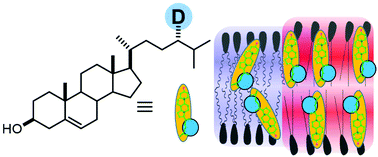Side-chain deuterated cholesterol as a molecular probe to determine membrane order and cholesterol partitioning†
Abstract
Cholesterol is an essential and ubiquitous component in mammalian cell membranes. However, its distributions and interactions with phospholipids are often elusive, partly because chemical modifications for preparing cholesterol probes often cause significant perturbations in its membrane behavior. To overcome these problems, a 2H-labeled probe (24-d-cholesterol), which perfectly retained the original membrane properties, was synthesized by a stereoselective introduction of 2H into the side chain of cholesterol. A deuterium label at the side-chain more sensitively reflects membrane fluidity than the conventional labeling at the 3 position of a sterol core (3-d-cholesterol), thus providing 24-d-cholesterol with desirable properties to report membrane ordering. Solid state 2H NMR of 24-d-cholesterol with sphingomyelins (SM) and unsaturated phosphatidylcholine in the bilayer membranes clearly revealed the partitioning ratio of cholesterol in the raft-like liquid ordered (Lo) phase and the liquid disordered phase based on cholesterol interactions with surrounding lipids in each phase. This probe turned out to be superior to the widely used 3-d-cholesterol; e.g., 24-d-cholesterol clearly revealed a 10 mol% difference in the Lo distribution ratios of cholesterol between palmitoyl-SM and stearoyl-SM. The comprehensive use of 24-d-cholesterol in solid state 2H NMR will disclose the cholesterol–lipid interactions, distribution ratio of cholesterol, and membrane ordering in model bilayers as well as more complicated biological membranes.

- This article is part of the themed collection: Chemical Biology in OBC


 Please wait while we load your content...
Please wait while we load your content...